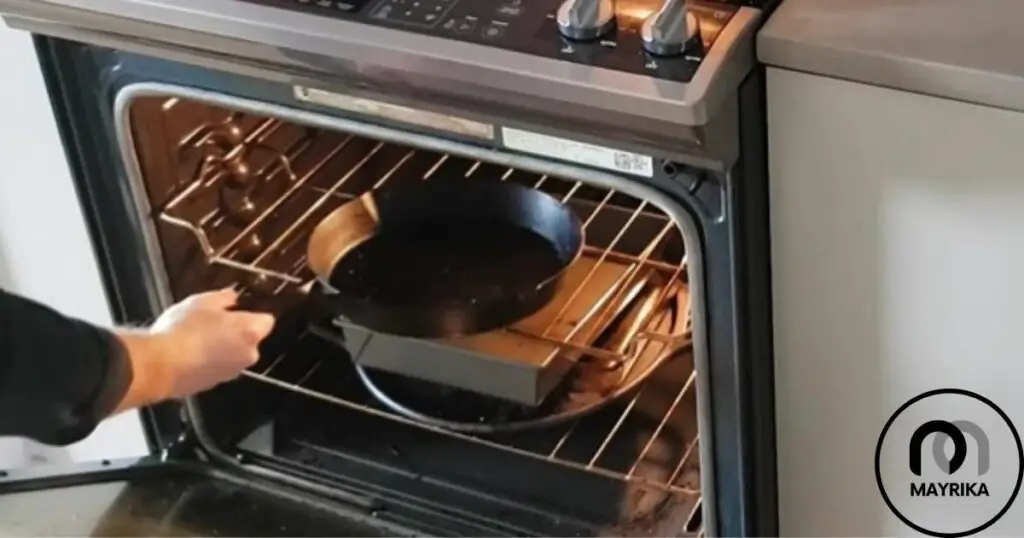Cast iron cookware is a versatile and durable tool that can be used in a variety of ways.
Seasoning cast iron cookware in the oven can make it more versatile and easy to use.
This guide will teach you how to season cast iron cookware in the oven.
What is cast iron?
Cast iron is a type of metal that is made principally from iron and carbon. It is strong and durable and can be machined into intricate shapes.
Cast iron is often used in cookware because it retains heat well and does not react with foods.
Cookware seasoning
Cookware seasoning is the process of coating the surface of cookware with oil or fat.
This creates a barrier between the cookware and food, which helps to prevent sticking and makes cleanup easier.
Seasoning also helps to protect the cookware from rust and corrosion.
Seasoning is typically done before using new cookware for the first time, and then periodically as needed.
Why you should season your cast iron cookware
Cast iron cookware is a great tool for creating delicious meals. However, it can be difficult to keep it seasoned.
Seasoning your cast iron cookware will help ensure that the iron retains its heat and prevents sticking.
Here are 3 reasons why you should season your cast iron cookware:
- Cast iron retains heat well and is great for cooking over slow or low heat. Seasoning your cast Iron will help to retain the heat and prevent sticking.
- Seasoning also helps to add flavor to your food. By adding a little bit of salt or pepper, you can enhance the flavors of your food without having to use extra spices.
- Cast iron is a natural non-stick surface. Seasoning will make this surface even more non-stick which will make cooking with cast iron much easier and faster.
How to season cast iron cookware in the oven
If you’re looking to season your cast iron cookware in the oven, there are a few things you’ll need to do first.
First, you’ll need to clean your cookware thoroughly with hot water and a stiff brush.
Once it’s clean, dry it completely and then coat it lightly with vegetable oil.
Next, preheat your oven to 350 degrees Fahrenheit and place your cookware upside down on the top rack.
Bake it for an hour, then turn off the oven and let the cookware cool completely before using it.

How to clean your cast iron cookware
Cast iron cookware is a great way to cook your food without using any oil or butter.
However, like any other type of cookware, cast iron needs to be cleaned regularly to avoid rust and corrosion.
Here are 6 steps for cleaning your cast iron cookware:
- Preheat your oven to 350 degrees F (175 degrees C).
- Wipe down the entire surface of the pan with a dry cloth.
- Pour 1 cup of baking soda into the pan and spread it around with a spoon.
- Place the pan in the oven and bake for 30 minutes, or until the pan is shiny and clean.
- Scrub the inside of the pan with a stainless steel scrubber pad or a stiff brush.
- Rinse off the pans with cool water and pat them dry with a towel.
How to store your cast iron cookware
Cast iron cookware is a classic piece of kitchen gear and can be used for a variety of purposes, from simple searing to braising and even baking.
However, like all kitchen equipment, cast iron cookware needs to be stored properly in order to avoid rusting and damage.
Here are a few tips on how to store your cast iron cookware:
1. Keep it dry – Cast iron is a metal, and like all metals, it needs moisture in order to stay durable.
If your cast iron cookware is left wet, it will rust and eventually fail.
Instead, store your cast iron cookware by placing it in an airtight container or storage bag that is placed in a cool, dry place.
2. Avoid direct heat – Cast iron cookware is best used over low or moderate heat.
Do not use direct heat on your cast iron cookware – this will only cause it to rust faster.
Instead, use indirect heat with a stovetop burner or oven element.
3. Avoid oiling – Cast iron is oil-resistant, but like any metal, it does absorb oil from cooking foods.
Avoid adding extra oil to your cast iron cookware – this will only make the metal harder to clean and more prone to rusting.
4. Keep it seasoned – Cast iron is a seasoning material itself and needs time to “season” before use.
After each use, wash your cast iron cookware with hot water and soap followed by a light coating of vegetable oil or cooking spray.
This will help protect the metal from rusting and make the cooking process easier overall.
Frequently Asked Questions
Do you have to bake cast iron to season?
Cast iron is a type of iron that has been treated with a process called seasoning.
This treatment makes the surface of the iron harder and less likely to rust.
Cast iron can be seasoned by baking it in the oven, but this is not always necessary.
Heating the iron to a very high temperature will also season it.
How do you season a cast iron skillet quickly?
If you’re in a hurry, the quickest way to season a cast iron skillet is to rub it with a layer of vegetable oil, then heat it in the oven at a high temperature for 30 minutes.
This will create a non-stick surface and help to prevent rust.
How long do you put a pan in the oven to season it?
It really depends on the pan – some need only a light coat of oil, while others may need a full coating.
Generally, you should start by lightly coating the pan with cooking spray and then adding your oil of choice.
You can then bake your food in the oven as directed.
Seasoning a pan in the oven typically takes around 25-30 minutes at a temperature between 425 degrees Fahrenheit and 450 degrees Fahrenheit.
What oil is best for seasoning cast iron?
There are many oils that can be used for seasoning cast iron.
Some of the most common include vegetable, olive, and canola oils.
It is important to use light oil when seasoning cast iron as too much oil can cause the iron to become too hot and difficult to work with.
How can you tell if cast iron is seasoned?
If you’re not sure whether your cast iron is seasoned, there are a few ways to tell.
First, try to see if there’s any food sticking to the surface. If the food slides right off, that’s a good sign that the pan is well-seasoned.
Another way to tell is by looking at the color of the surface. If it’s a deep black, that means the pan has been well-seasoned.
Finally, you can try to see if the pan has a smooth surface. If it does, that means it’s probably well-seasoned.
Is 500 degrees hot enough to season cast iron?
500 degrees Fahrenheit is the ideal temperature for seasoning cast iron.
This is the temperature at which the cast iron starts to become malleable and develops a black patina.
However, it is possible to season cast iron at temperatures as low as 375 degrees Fahrenheit, and it is also possible to season cast iron at temperatures as high as 500 degrees Fahrenheit.
Why are things sticking to my cast iron pan?
Cast iron is a type of metal that is made by heating iron ore in a low oxygen atmosphere.
This process creates a very durable metal with high heat tolerance.
Because cast iron is so heat resistant, it can often stick to the pan when food is being cooked in it.
The high heat and acidic environment of the pan can cause the iron to react with the food, forming a sticky residue.
In order to prevent sticking, it is important to preheat the pan before adding any oil or ingredient and to use medium-high heat when cooking.
Do you clean cast iron after every use?
Cleaning cast iron is important in order to keep it in good condition.
Cast iron should be cleaned after every use, whether it is used for cooking or for any other purpose.
The best way to clean cast iron is by using a scouring pad and hot water.
It is also important to dry the cast iron before storing it.
Final Words
Cast iron is one of the most versatile types of cookware you can own, but you need to take care of it to receive the full benefits.
Seasoning cast iron before you use it for the first time and then maintaining the seasoning is vital to its longevity.
With this article, we hope you’ve gained a better understanding of how to season cast iron cookware.
Thank you for reading, we are always excited when one of our posts is able to provide useful information on a topic like this!
